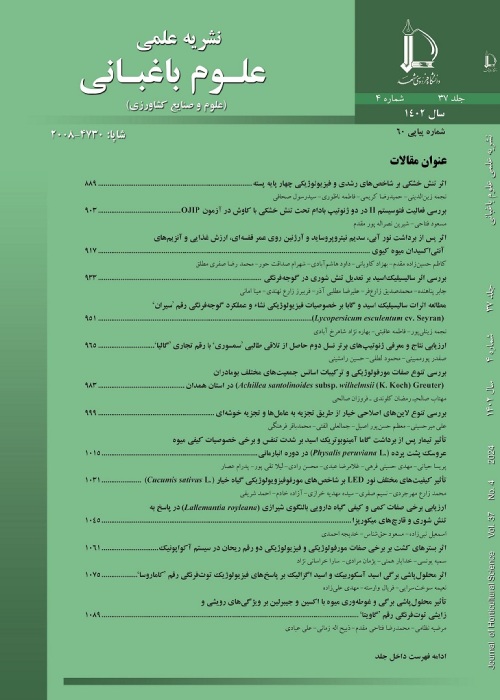Effects of Hydrogen Peroxide on Decreasing Microbial Contaminations in Raisins of Bavanat Region
Author(s):
Article Type:
Research/Original Article (دارای رتبه معتبر)
Abstract:
Introduction
Raisins are dried grapes and are prepared from some varieties of grapes (Vitis vinifera) in different ways, such as exposing grapes to direct sunlight and mechanical methods. There is a possibility of contamination of various types of raisins with different microorganisms during the stages of harvesting and drying grapes, transportation and marketing of raisins, especially when they are presented in open boxes. The traditional process of preparing and packing raisins in Bovanat region (the main raisin production area of Fars province) makes this product prone to microbial contamination dangerous for human health. The history of consumption of raisin is very old. The Bible provides the first written mention of raisin around 1000 B.C., drying is one of the oldest methods of food preservations; the main purpose of this experiment is reducing the moisture content to level which allows safe storage without spoilage. It has been reported that the use of hydrogen peroxide (H2O2) treatments reduces the microbial contamination loads in dried raisins. Moreover, washing with hydrogen peroxide solution can markedly reduce the loads of human pathogens including Escherichia coli. Primitive methods of making and packaging of raisins in Bavanat region contribute to make them vulnerable to microbial contamination and may be harmful for health. This research was conducted in order to determine the initial microbial contamination on the surface of three types of raisins prepared from the Keshmeshi grape cultivar and using hydrogen peroxide to reduce these microbial contaminations.Materials and Methods
The use of hydrogen peroxide as a potential antimicrobial treatment was investigated for three types of raisins in Bovanat region. For this purpose, three samples of raisins (Sun-dried, Shade-dried and Sultana raisins) have investigated. Raisins samples randomly were purchased from a local retailer in Shiraz (Iran). For this experiment, raisin samples with uniform size were selected and damaged or diseased berries were discarded. Two concentrations of hydrogen peroxide applied to microbial disinfection were 0% and 0.9%. The raisins that were prepared underwent a treatment process where they were dipped for 5 minutes in solutions containing either 0% or 0.9% hydrogen peroxide. Afterward, the raisins were washed with distilled water for 1 minute to remove any residue. A control group was also included, consisting of raisin samples treated with water (0% hydrogen peroxide). For each sample, measurements were taken for microbial count, population of yeasts and other molds, Aspergillus, Coliform bacteria, and Escherichia coli. The experiment was designed as a factorial (2x3) based on a completely randomized block design with 3 replications. The data were analyzed using SPSS 22.0, and mean data were compared using Duncan's multiple range tests at a 1% probability level.Results and Discussion
The results showed that there was a significant difference (P≤1%) between hydrogen peroxide concentration treatments regarding to microbial contamination. There was also a significant difference (P≤1%) between the raisin samples in terms of microbial contamination. The results also revealed the presence of high amount of microbial infection on surface of all raisin samples. The microbial contamination load of Sultana raisins was higher than other raisins. The results also indicate that Escherichia coli was not detected in both sun-dried and shade-dried samples, but it was observed in Sultana raisins. Surface disinfection of Sultana raisin samples with 9% of hydrogen peroxide removed Escherichia coli infection. Hydrogen peroxide was effective in reducing the microbial contamination of all three raisin samples. It seems hydrogen peroxide to be more effective in reducing microbial contamination in sun-dried and shade-dried samples. Sultana raisin had highest contamination of mold and yeast while sun-dried and shade-dried raisins were lowest. The effect of hydrogen peroxide on reducing mold and yeast contamination was not the same in all raisin samples, so that the highest effect on reducing mold and yeast contamination was found in sun-dried and shade-dried raisins. The least effect on this contamination was observed in sultana raisins. Aspergillus was not detected in sun-dried and shade-dried samples but it was observed in sultana raisins. Hydrogen peroxide was not effective against Aspergillus. The microbial contamination of all raisin samples which affected by 0.9% hydrogen peroxide was decreased significantly (P≤1%). Effect of hydrogen peroxide at 0.9% on removing of microbial infection in sun-dried and shade- dried raisins was similar and it was more than Sultana raisins.Conclusion
All three raisin samples were infected with Coliform bacteria, mold and yeast. In the case of Escherichia coli infection, it was detected only in sultana samples. Hydrogen peroxide was effective in reducing the microbial infection of all raisin samples. It was more effective in reducing the total number of microbes in sun-dried and shade-dried raisins. Hydrogen peroxide with a concentration of 0.9% is effective for eliminating the microbial infection of raisins, and the use of hydrogen peroxide with a concentration of 0.9% can be used to disinfect raisins.Keywords:
Language:
Persian
Published:
Journal of horticulture science, Volume:37 Issue: 1, 2023
Pages:
63 to 73
magiran.com/p2585062
دانلود و مطالعه متن این مقاله با یکی از روشهای زیر امکان پذیر است:
اشتراک شخصی
با عضویت و پرداخت آنلاین حق اشتراک یکساله به مبلغ 1,390,000ريال میتوانید 70 عنوان مطلب دانلود کنید!
اشتراک سازمانی
به کتابخانه دانشگاه یا محل کار خود پیشنهاد کنید تا اشتراک سازمانی این پایگاه را برای دسترسی نامحدود همه کاربران به متن مطالب تهیه نمایند!
توجه!
- حق عضویت دریافتی صرف حمایت از نشریات عضو و نگهداری، تکمیل و توسعه مگیران میشود.
- پرداخت حق اشتراک و دانلود مقالات اجازه بازنشر آن در سایر رسانههای چاپی و دیجیتال را به کاربر نمیدهد.
In order to view content subscription is required
Personal subscription
Subscribe magiran.com for 70 € euros via PayPal and download 70 articles during a year.
Organization subscription
Please contact us to subscribe your university or library for unlimited access!


